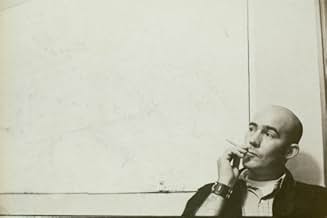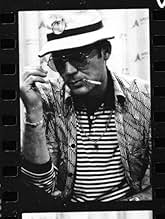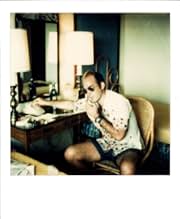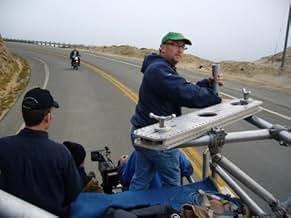IMDb-BEWERTUNG
7,6/10
8690
IHRE BEWERTUNG
Füge eine Handlung in deiner Sprache hinzuA portrait of the late gonzo journalist Hunter S. Thompson.A portrait of the late gonzo journalist Hunter S. Thompson.A portrait of the late gonzo journalist Hunter S. Thompson.
- Regie
- Drehbuch
- Hauptbesetzung
- Auszeichnungen
- 1 Gewinn & 5 Nominierungen insgesamt
Hunter S. Thompson
- Self
- (Archivfilmmaterial)
Oscar Acosta
- Self
- (Archivfilmmaterial)
Muhammad Ali
- Self
- (Archivfilmmaterial)
Warren Beatty
- Self
- (Archivfilmmaterial)
Empfohlene Bewertungen
Gonzo: The Life and Work of Dr. Hunter S. Thompson: 6 out of 10: Is Hunter S Thompson any more relevant to modern journalism than Joe Namath is to modern football? After all, both were men of their times. In addition, both faded badly by the mid-seventies. Thompson's early work is excellent (a copy of "The Proud Highway" sits on my bookshelf) and reached its pinnacle with Fear and Loathing on the Campaign Trail '72.
A mere three years later Rolling Stone publisher Jenn Warner had become so fed up with Thompson he basically tried to have him killed.
As Gonzo.org puts it "Then, early one evening in March 1975, Hunter was watching a nightmarish film of the evacuation of Da Nang on the evening news. The phone rang, and Hunter picked it up. It was Wenner, saying, "How would you like to go to Vietnam?" Hunter could not resist. The collapse of the American empire was a happening tailor-made for his talents. Within days, he was heading out over the Pacific. He arrived in Saigon hours after Thieu's palace had been bombed and staffed by his own Air Force. For a man who lived with the conviction that the world was going to end next Monday, this was an especially ominous portent. Thompson had the sense of "walking into a death camp." This was it. He would never get out alive. As it turned out, the fate that was in store for him was even worse. Thompson discovered that, even as he was on his way to Vietnam, Wenner had taken him off retainer - in effect, fired him - and with the retainer went his staff benefits, including health and life insurance." Also leaving him no way out of Vietnam... a one-way ticket if you will.
Dude that is cold...
And that is the very nature of the problem with this documentary. Why is not this story mentioned? Who knows? It certainly was a turning point in Thompsons life (He apparently became more withdrawn and paranoid afterwards... understandably so) Gonzo is a pollyanna look at Thompson. The abuse of his first marriage gets a glancing look and all the interviewees (Including Jimmy Carter, Pat Buchanan and Jenn Werner) seem hesitant to speak ill of the dead.
The fact that in a few short years Thompson turned from a well-respected writer into a Muppet and Doonesbury cartoon is not covered well. The fact is mentioned but the reasons are glossed over. It is as if the film is worried that by mentioning his failures it will reduce his significance.
Yet, I would argue that Thompson's effect on Journalism is larger than he gets credit for. Reporters nowadays often ignore facts, concentrating instead on how events make them feel. Anderson Cooper crying during the Hurricane Katrina coverage threatened to become a bigger story than the storm itself. (He was not helped when fellow Mensa candidate Wolf Blitzer said "You simply get chills every time you see these poor individuals…many of these people, almost all of them that we see are so poor and they are so black") The documentary never really focuses on this aspect either. Gonzo seems to fear pulling back any of the masks its subject wears presumably scared of what it might find. Gonzo would have been better served concentrating on one period of time and focusing its energies.
That said, for those unfamiliar with Hunter S Thompson outside of his Muppet form this is a good start. Moreover, if it gets people to read his early work so much the better.
A mere three years later Rolling Stone publisher Jenn Warner had become so fed up with Thompson he basically tried to have him killed.
As Gonzo.org puts it "Then, early one evening in March 1975, Hunter was watching a nightmarish film of the evacuation of Da Nang on the evening news. The phone rang, and Hunter picked it up. It was Wenner, saying, "How would you like to go to Vietnam?" Hunter could not resist. The collapse of the American empire was a happening tailor-made for his talents. Within days, he was heading out over the Pacific. He arrived in Saigon hours after Thieu's palace had been bombed and staffed by his own Air Force. For a man who lived with the conviction that the world was going to end next Monday, this was an especially ominous portent. Thompson had the sense of "walking into a death camp." This was it. He would never get out alive. As it turned out, the fate that was in store for him was even worse. Thompson discovered that, even as he was on his way to Vietnam, Wenner had taken him off retainer - in effect, fired him - and with the retainer went his staff benefits, including health and life insurance." Also leaving him no way out of Vietnam... a one-way ticket if you will.
Dude that is cold...
And that is the very nature of the problem with this documentary. Why is not this story mentioned? Who knows? It certainly was a turning point in Thompsons life (He apparently became more withdrawn and paranoid afterwards... understandably so) Gonzo is a pollyanna look at Thompson. The abuse of his first marriage gets a glancing look and all the interviewees (Including Jimmy Carter, Pat Buchanan and Jenn Werner) seem hesitant to speak ill of the dead.
The fact that in a few short years Thompson turned from a well-respected writer into a Muppet and Doonesbury cartoon is not covered well. The fact is mentioned but the reasons are glossed over. It is as if the film is worried that by mentioning his failures it will reduce his significance.
Yet, I would argue that Thompson's effect on Journalism is larger than he gets credit for. Reporters nowadays often ignore facts, concentrating instead on how events make them feel. Anderson Cooper crying during the Hurricane Katrina coverage threatened to become a bigger story than the storm itself. (He was not helped when fellow Mensa candidate Wolf Blitzer said "You simply get chills every time you see these poor individuals…many of these people, almost all of them that we see are so poor and they are so black") The documentary never really focuses on this aspect either. Gonzo seems to fear pulling back any of the masks its subject wears presumably scared of what it might find. Gonzo would have been better served concentrating on one period of time and focusing its energies.
That said, for those unfamiliar with Hunter S Thompson outside of his Muppet form this is a good start. Moreover, if it gets people to read his early work so much the better.
Hunter S. Thompson was a supremely funny man but, alas, was a deeply unhappy one. Thompson's political positions could have hardly been more different from my own. Nevertheless, I admired his work because he was such an original and so entertaining. I did so mainly because I knew better than to ever take him seriously. Unfortunately, Thompson never learned to not take himself too seriously and that failing led to his self destructiveness and, ultimately to his suicide.
Gonzo: The Life and Work of Dr. Hunter S. Thompson is a mostly loving look at Thompson through the eyes of many of his friends and the politicians he wrote about. It shows a man with a profoundly dichotomous nature: creativeness and wit on its positive side but dark, self destructive depression on the other. It created the richly entertaining Gonzo journalist who those of us who admired his work so enjoyed but also planted the seeds for his depression and death.
Near the end of the film, Thompson's first wife, Sondi, takes issue with those who characterize Thompson's suicide as "heroic." I think she has a point. Thompson had largely fallen from the public eye some years before he killed himself in 2005 at the age of 67. In a note delivered to his wife four days before his death, which was described by both his family and the police as a suicide note, Thompson wrote, under the title "Football Season is Over":
"No More Games. No More Bombs. No More Walking. No More Fun. No More Swimming. 67. That is 17 years past 50. 17 more than I needed or wanted. Boring. I am always bitchy. No Fun — for anybody. 67. You are getting Greedy. Act your old age. Relax — This won't hurt."
That about sums it up.
Gonzo: The Life and Work of Dr. Hunter S. Thompson is a mostly loving look at Thompson through the eyes of many of his friends and the politicians he wrote about. It shows a man with a profoundly dichotomous nature: creativeness and wit on its positive side but dark, self destructive depression on the other. It created the richly entertaining Gonzo journalist who those of us who admired his work so enjoyed but also planted the seeds for his depression and death.
Near the end of the film, Thompson's first wife, Sondi, takes issue with those who characterize Thompson's suicide as "heroic." I think she has a point. Thompson had largely fallen from the public eye some years before he killed himself in 2005 at the age of 67. In a note delivered to his wife four days before his death, which was described by both his family and the police as a suicide note, Thompson wrote, under the title "Football Season is Over":
"No More Games. No More Bombs. No More Walking. No More Fun. No More Swimming. 67. That is 17 years past 50. 17 more than I needed or wanted. Boring. I am always bitchy. No Fun — for anybody. 67. You are getting Greedy. Act your old age. Relax — This won't hurt."
That about sums it up.
After Enron: The Smartest Guys in the Room, Taxi to the Dark Side, and this vivid, significant depiction of the Sixties and Seventies superstar journalist Hunter Thompson, Alex Gibney has emerged as clearly one of the best documentary filmmakers we've got and also one of the most prolific.
Gibney tells a very smart, very verbal, very funny but also intensely significant story here. Some of the people who speak most highly of Thompson on camera are Billy Carter, William McGovern, and longtime Republican presidential adviser Pat Buchanan,as well as writer Tom Woolf and Thompson's editors at Rolling Stone, for which he did his best periodical pieces, the notable ones turned into books. More intimate details--but the man was such a perpetual performer that public and private are hard to separate--come from Thompson's first and second wives. And the English artist Ralph Steadman, who illustrated the writing, has much to say, as do plenty of others. When Steadman first met Thompson he fed the Brit Psilocybin and he was never the same. Steadman became an invaluable cohort and collaborator and his wild drawings provide a perfect visual counterpart to Thompson's written words on screen.
Thompson was a notorious wild man from early on. "I wouldn't recommend sex, drugs or insanity for everyone, but they've always worked for me," he said. Prodigious in his consumption of drugs and alcohol, he was witness to some of the great events of his time, and got deeply involved in politics and opposition to the Vietnam war and of course the counterculture. Lean, athletic, flashily dressed, with trademark balding pate, big sunglasses, cigarette holder and drink in hand, Thompson was a demon at the IBM Selectric, gleefully spinning out brilliant pieces nobody else could have written, a master of outrage and wit.
Fueled by craziness, substances, and his own tongue-in-cheek joie de vivre, he devised his own outrageous style of writing in which cold clear fact was blended with wild invention and the adjectives and metaphors flew like hornets around a honey pot. Others too partook of the kind of journalism he practiced. The times--the flamboyant and boisterous and revolutionary Sixties and early Seventies-- seemed to call for a new more violent, more committed language in journalism. Norman Mailer also wrote about the democratic convention in Chicago in 1968 and on hand for Esquire were the likes of Jean Genet and William Burroughs. Three is something of Burroughs in Thompson, the drugs and the outrage and a way of seeing convention as conspiracy. One of Thompson's famous quotes gives a hint of the link: "America... just a nation of two hundred million used car salesmen with all the money we need to buy guns and no qualms about killing anybody else in the world who tries to make us uncomfortable." This was the moment when the distinction between fiction and non-fiction blurred: Tom Wolfe (The Electric Kool-Aid Acid Test, which used raw material from the more adventurous Thompson), Thompson's act of "embedded journalism" as Wolfe calls it, Hell's Angels), Truman Capote's murder story In Cold Blood done for The New Yorker, were all variations on the idea of the "non-fiction novel." Mailer had done a heroically personal and novelistic account of the 1967 March on the Pentagon, The Armies of the Night. The film might do a bit more to put Thompson in all this context, but it's clearly implied. He called his wild style "gonzo" journalism.
Thompson also wrote about Las Vegas as the American dream and about Nixon, whom he loathed. He also used a tape recorder a lot. This provides great material for the film. So does the Terry Gilliam film version of Fear and Loathing in Las Vegas; and Johnny Depp, who played Thompson in the film and became a great fan and friend, reads salient passages sitting in front of a well-stocked bar. Depp paid for the spectacular monument/funeral for the writer that Thompson had--on film--planned out long before, in which his ashes are fired into the Colorado hills. Ralph Steadman did the sketches. This is shown at the end of the film and provides a lovely son et lumière finale.
Thompson's innate violence may explain how he could have blended in so well for a while with the Hell's Angels. He kept at least twenty firearms on hand in his house, all loaded, his first wife reports. He always planned to end his life with suicide and he shot himself. He did it on a nice day in February almost as a family event, with his son, daughter-in-law and grandson at the house and on the phone with his wife, a shot to the head, at the age of 68, not an act of depression but the completion of a careful plan. It was over. And he had been here to see George W. Bush and predict the decline and fall of the American empire. A late collection of short pieces is entitled Hey Rube: Blood Sport, the Bush Doctrine, and the Downward Spiral of Dumbness.
His dissipation took its toll and so did fame. He fell into playing a self-parodying avatar of himself and his writing deteriorated after the later Seventies, so he had about ten good years and about twenty not-so-good ones. Some have dwelt on his decline; Gonzo doesn't. His writing faltered as early as 1974 when he went to Zaire with Steadman to cover the Foreman-Ali "Rumble in the Jungle" and he got drunk at the pool during the fight and never finished the story. Given how bright he burned and how hard he lived, it was inevitable that the man would burn out early And writing did not by any means fizzle out even into the Nineties. There is an immense wealth of spinoffs on film; Gibney had rich, rich material to work with here.
The best that could happen is that this beautifully edited and greatly entertaining film makes a host of new converts to the writing.
Gibney tells a very smart, very verbal, very funny but also intensely significant story here. Some of the people who speak most highly of Thompson on camera are Billy Carter, William McGovern, and longtime Republican presidential adviser Pat Buchanan,as well as writer Tom Woolf and Thompson's editors at Rolling Stone, for which he did his best periodical pieces, the notable ones turned into books. More intimate details--but the man was such a perpetual performer that public and private are hard to separate--come from Thompson's first and second wives. And the English artist Ralph Steadman, who illustrated the writing, has much to say, as do plenty of others. When Steadman first met Thompson he fed the Brit Psilocybin and he was never the same. Steadman became an invaluable cohort and collaborator and his wild drawings provide a perfect visual counterpart to Thompson's written words on screen.
Thompson was a notorious wild man from early on. "I wouldn't recommend sex, drugs or insanity for everyone, but they've always worked for me," he said. Prodigious in his consumption of drugs and alcohol, he was witness to some of the great events of his time, and got deeply involved in politics and opposition to the Vietnam war and of course the counterculture. Lean, athletic, flashily dressed, with trademark balding pate, big sunglasses, cigarette holder and drink in hand, Thompson was a demon at the IBM Selectric, gleefully spinning out brilliant pieces nobody else could have written, a master of outrage and wit.
Fueled by craziness, substances, and his own tongue-in-cheek joie de vivre, he devised his own outrageous style of writing in which cold clear fact was blended with wild invention and the adjectives and metaphors flew like hornets around a honey pot. Others too partook of the kind of journalism he practiced. The times--the flamboyant and boisterous and revolutionary Sixties and early Seventies-- seemed to call for a new more violent, more committed language in journalism. Norman Mailer also wrote about the democratic convention in Chicago in 1968 and on hand for Esquire were the likes of Jean Genet and William Burroughs. Three is something of Burroughs in Thompson, the drugs and the outrage and a way of seeing convention as conspiracy. One of Thompson's famous quotes gives a hint of the link: "America... just a nation of two hundred million used car salesmen with all the money we need to buy guns and no qualms about killing anybody else in the world who tries to make us uncomfortable." This was the moment when the distinction between fiction and non-fiction blurred: Tom Wolfe (The Electric Kool-Aid Acid Test, which used raw material from the more adventurous Thompson), Thompson's act of "embedded journalism" as Wolfe calls it, Hell's Angels), Truman Capote's murder story In Cold Blood done for The New Yorker, were all variations on the idea of the "non-fiction novel." Mailer had done a heroically personal and novelistic account of the 1967 March on the Pentagon, The Armies of the Night. The film might do a bit more to put Thompson in all this context, but it's clearly implied. He called his wild style "gonzo" journalism.
Thompson also wrote about Las Vegas as the American dream and about Nixon, whom he loathed. He also used a tape recorder a lot. This provides great material for the film. So does the Terry Gilliam film version of Fear and Loathing in Las Vegas; and Johnny Depp, who played Thompson in the film and became a great fan and friend, reads salient passages sitting in front of a well-stocked bar. Depp paid for the spectacular monument/funeral for the writer that Thompson had--on film--planned out long before, in which his ashes are fired into the Colorado hills. Ralph Steadman did the sketches. This is shown at the end of the film and provides a lovely son et lumière finale.
Thompson's innate violence may explain how he could have blended in so well for a while with the Hell's Angels. He kept at least twenty firearms on hand in his house, all loaded, his first wife reports. He always planned to end his life with suicide and he shot himself. He did it on a nice day in February almost as a family event, with his son, daughter-in-law and grandson at the house and on the phone with his wife, a shot to the head, at the age of 68, not an act of depression but the completion of a careful plan. It was over. And he had been here to see George W. Bush and predict the decline and fall of the American empire. A late collection of short pieces is entitled Hey Rube: Blood Sport, the Bush Doctrine, and the Downward Spiral of Dumbness.
His dissipation took its toll and so did fame. He fell into playing a self-parodying avatar of himself and his writing deteriorated after the later Seventies, so he had about ten good years and about twenty not-so-good ones. Some have dwelt on his decline; Gonzo doesn't. His writing faltered as early as 1974 when he went to Zaire with Steadman to cover the Foreman-Ali "Rumble in the Jungle" and he got drunk at the pool during the fight and never finished the story. Given how bright he burned and how hard he lived, it was inevitable that the man would burn out early And writing did not by any means fizzle out even into the Nineties. There is an immense wealth of spinoffs on film; Gibney had rich, rich material to work with here.
The best that could happen is that this beautifully edited and greatly entertaining film makes a host of new converts to the writing.
No holds barred documentary covering the bizarre life of Dr. Hunter S. Thompson - the father of Gonzo journalism.
This film covers all his classic moments:Hell's Angels, Race for Sheriff of Aspen, Fear and Loathing in Las Vegas and on the Campaign Trail; Muhammad Ali vs. George Foreman, George McGovern, Jimmy Carter, etc. The articles he wrote over several decades for Rolling Stone Magazine are given heavy perspective and no one represented the voice of the turbulent 60's and 70's like Hunter aka Raoul Drake.
Great soundtrack, clips & guest from Johnny Depp to Jimmy Buffett. The loss of a great voice we could really use today!
This film covers all his classic moments:Hell's Angels, Race for Sheriff of Aspen, Fear and Loathing in Las Vegas and on the Campaign Trail; Muhammad Ali vs. George Foreman, George McGovern, Jimmy Carter, etc. The articles he wrote over several decades for Rolling Stone Magazine are given heavy perspective and no one represented the voice of the turbulent 60's and 70's like Hunter aka Raoul Drake.
Great soundtrack, clips & guest from Johnny Depp to Jimmy Buffett. The loss of a great voice we could really use today!
In the sphere of all the memoirs collected in this post-counter culture portrait of a counter culture icon, narrated by Johnny Depp who played him to some extent in Terry Gilliam's film version of Fear and Loathing In Las Vegas, there was one issue I found noticeably absent: The reality of the unhappiness and suffering of this comic book character of a painfully vague crustacean. The film finds remarkable approach to the people involved in his life, but not even from his two wives do we get a picture of what he was like the inevitable physiological drawbacks caught up with him. He was plainly, intensely addicted to drugs and alcohol, and after a trance-like sleep not much different than passing out at the right time, he would have awakened in a mess of depression and alienation. What did he say on those mornings and afternoons? How did he act?
Of course, it is said during the film that he would drink all day or take drugs and there was no discernible effect. I don't think I buy that. What if it was a front? The main thing is, he wasn't killed by day-to-day simultaneous intakes of alcohol and pills, which can really tear up your head, which are said to cause a likelihood of seizures. He was killed by himself, which he himself scripted and all of his friends totally assumed would happen. He took every reckless risk there was to take, and he, not time or drugs or people, ended it all because his own agenda was dried out. As a journalist, for instance, he reported that at some point in a presidential primary Edward Muskie consumed Ibogaine, a psychoactive drug given out by a "mysterious Brazilian doctor," information which was entirely fictitious yet was actually learned and passed along as truth. Thompson's stunt may have been part of the cause of Muskie's furious irritability throughout the 1972 Florida primary. No other journalist could have carried such a fib, but Thompson was fortified by his myth that he could publish anything.
He was an unpredictable, nearly spellbinding writer, with a savage hilarity in his style. He was never aware of impartiality. In 1972 he backed George McGovern as the Democratic nominee, and no slander was too degraded for him to attach to McGovern's rivals in either party.
This documentary by Alex Gibney is notable, to begin with, for recapitulating to us through how many fires Thompson ran of his very own volition. He rode with the Hells' Angels for a year. Ran for sheriff and lost, but came in very close. Covered the 1972 and 1976 presidential primaries, and had an inexplicable personality, so that for instance McGovern, Tom Wolfe and his wives and son think of him lovingly, but also as enormously cruel and spiteful.
Nobody in the film was around while he was doing things that initially fortified him within the sphere of legend. He became celebrated for writing about that edge of speed going around a bend which you could never pass without killing yourself. He rode loads of edges on his motorcycle, and never got killed. He said persistently that the way he chose to go was by doing the job himself, with a gun, before his success declined. He died that way, using one of his 22 firearms, but he had most definitely declined by that time.
Without doubt he made an impact on his generation like not many other journalists ever have. This documentary is all you could wish for about the man's career and involvement with different people, but there is something at his core that we are inhibited from fully understanding for sure. And it results in you speculating on how so many people liked him when he didn't even seem to have liked himself?
Of course, it is said during the film that he would drink all day or take drugs and there was no discernible effect. I don't think I buy that. What if it was a front? The main thing is, he wasn't killed by day-to-day simultaneous intakes of alcohol and pills, which can really tear up your head, which are said to cause a likelihood of seizures. He was killed by himself, which he himself scripted and all of his friends totally assumed would happen. He took every reckless risk there was to take, and he, not time or drugs or people, ended it all because his own agenda was dried out. As a journalist, for instance, he reported that at some point in a presidential primary Edward Muskie consumed Ibogaine, a psychoactive drug given out by a "mysterious Brazilian doctor," information which was entirely fictitious yet was actually learned and passed along as truth. Thompson's stunt may have been part of the cause of Muskie's furious irritability throughout the 1972 Florida primary. No other journalist could have carried such a fib, but Thompson was fortified by his myth that he could publish anything.
He was an unpredictable, nearly spellbinding writer, with a savage hilarity in his style. He was never aware of impartiality. In 1972 he backed George McGovern as the Democratic nominee, and no slander was too degraded for him to attach to McGovern's rivals in either party.
This documentary by Alex Gibney is notable, to begin with, for recapitulating to us through how many fires Thompson ran of his very own volition. He rode with the Hells' Angels for a year. Ran for sheriff and lost, but came in very close. Covered the 1972 and 1976 presidential primaries, and had an inexplicable personality, so that for instance McGovern, Tom Wolfe and his wives and son think of him lovingly, but also as enormously cruel and spiteful.
Nobody in the film was around while he was doing things that initially fortified him within the sphere of legend. He became celebrated for writing about that edge of speed going around a bend which you could never pass without killing yourself. He rode loads of edges on his motorcycle, and never got killed. He said persistently that the way he chose to go was by doing the job himself, with a gun, before his success declined. He died that way, using one of his 22 firearms, but he had most definitely declined by that time.
Without doubt he made an impact on his generation like not many other journalists ever have. This documentary is all you could wish for about the man's career and involvement with different people, but there is something at his core that we are inhibited from fully understanding for sure. And it results in you speculating on how so many people liked him when he didn't even seem to have liked himself?
Wusstest du schon
- WissenswertesAt 1:35 you can see a Richard Nixon mask under the TV. This is a nod to the 1980 movie "Where The Buffalo Roam" starring Bill Murray as Thompson, where he uses that mask to train his dog to attack a scarecrow-like recreation of the former President.
- PatzerWhen the film mentions that Hunter Thompson had a crush on Jefferson Airplane singer Grace Slick, archival footage instead shows the Airplane's first female singer, Signe Anderson.
- VerbindungenFeatures To Tell the Truth (1956)
Top-Auswahl
Melde dich zum Bewerten an und greife auf die Watchlist für personalisierte Empfehlungen zu.
- How long is Gonzo?Powered by Alexa
Details
Box Office
- Bruttoertrag in den USA und Kanada
- 1.252.100 $
- Eröffnungswochenende in den USA und in Kanada
- 191.942 $
- 6. Juli 2008
- Weltweiter Bruttoertrag
- 1.491.958 $
- Laufzeit
- 2 Std.(120 min)
- Farbe
- Sound-Mix
- Seitenverhältnis
- 1.85 : 1
Zu dieser Seite beitragen
Bearbeitung vorschlagen oder fehlenden Inhalt hinzufügen































